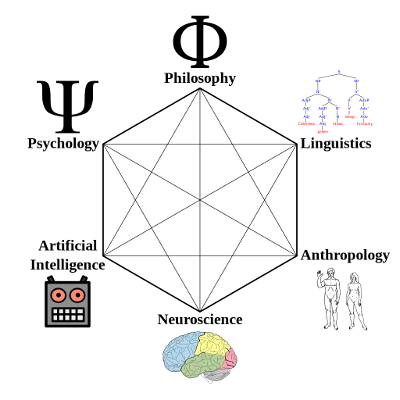What is cognition? I think everyone has a rough idea about what cognition is, but giving a clear definition of it is kind of difficult. Even if you give it some thought, it still remains a bit fuzzy. What is cognitive science and what are the people researching in this field are actually studying?
I am a student of cognitive science and right now I have to prepare for an exam. Since I don't want all the knowledge I acquire only to be inside my head, I decided to use this opportunity to share my study progress with all of you and hopefully give you and insight of what cognitive science is all about and of the things that you are dealing with, when studying cognitive science.
Before I started studying cognitive science, I only had a rough idea of what it is about. I have to admit that now, more than a year later, I am still not able to give a crisp definition of what this phenomenon is, that I am studying. But I broadened my view of what cognition is and what does it mean “to have cognition”: before I thought that cognition is only a very abstract and “high-level” feature of humans, but during my studies I learned that also very simple organisms and even machines are able to have cognition.
Wikipedia gives the following definition of cognitive science:
Cognitive science is the interdisciplinary, scientific study of the mind and its processes.
So the subject we are studying is “the mind”, unfortunately this is yet another concept that's far from being clearly defined and I guess that again everybody has a rough idea of what this could be: humans surely have a mind, but what about animals or even machines? Can something like an artificial mind exist or does it have to be biological? Again I am raising a lot of questions which I'm not really able to answer. So let's leave this for now and let's look at a word in this definition, that might not attract so much attention at first: interdisciplinary. I think interdisciplinary gained a lot of popularity in the recent years and it is quite common to read about research teams being interdisciplinary. What it means is that instead of looking at a phenomenon only through the “eyes” of one discipline, looking at it through the “eyes” of different disciplines. What is it good for? Well, if you look at a phenomenon only from the angle of one discipline you are likely to ignore certain features, which are not really of interest for that discipline, but if you look at it from different angles you not only see these features, but maybe also see that those features (which you would have ignored otherwise) are actually interesting as well and help to get a better understanding of the phenomenon as whole. If you have a phenomenon like cognition, this helps a lot to get a better understanding of the phenomenon.

Source: Wikipedia
This figure illustrates which different disciplines are contributing to cognitive science and in my opinion gives a nice overview of what it is all about. When it comes to study the mind and its processes, I think one of the first things that come to mind (pun not intended) is psychology. When I'm asking people what they think cognitive science is about, the answer is quite often: “psychology with more math”, which is surprisingly not that far off, since also artificial intelligence is one of the contributing fields (which is indeed heavy on math). And of course you can not study the mind without looking at its substrate, so neuroscience is also involved into this. I guess you got the idea, if not feel free to ask me :)
To go back to what I am going to do in this series: I will review and present some scientific papers, which are all somehow connected to cognitive science. The topics I will be writing about include embodiment, language, how neurons are involved in all of this and many more.
I am happy to answer any question I get, since it forces me to re-evaluate my own views and try to come up with a better explanation.
Very interesting! can't wait to read more :D
Downvoting a post can decrease pending rewards and make it less visible. Common reasons:
Submit
More content is on its way :)
Downvoting a post can decrease pending rewards and make it less visible. Common reasons:
Submit
Cognition is indeed hard to define and, as you probably know, there are quite a few definitions.
I'm looking forward to further posts - particularly on theory of mind and inter-species communication!
Downvoting a post can decrease pending rewards and make it less visible. Common reasons:
Submit
Yes, defining what cognition is, is where the philosophy part of cognitive science comes into play.
Inter-species communication sounds interesting, I'll probably take a look into it. For theory of mind: I am going to touch this topic, when writing about mirror neurons.
Downvoting a post can decrease pending rewards and make it less visible. Common reasons:
Submit
Downvoting a post can decrease pending rewards and make it less visible. Common reasons:
Submit